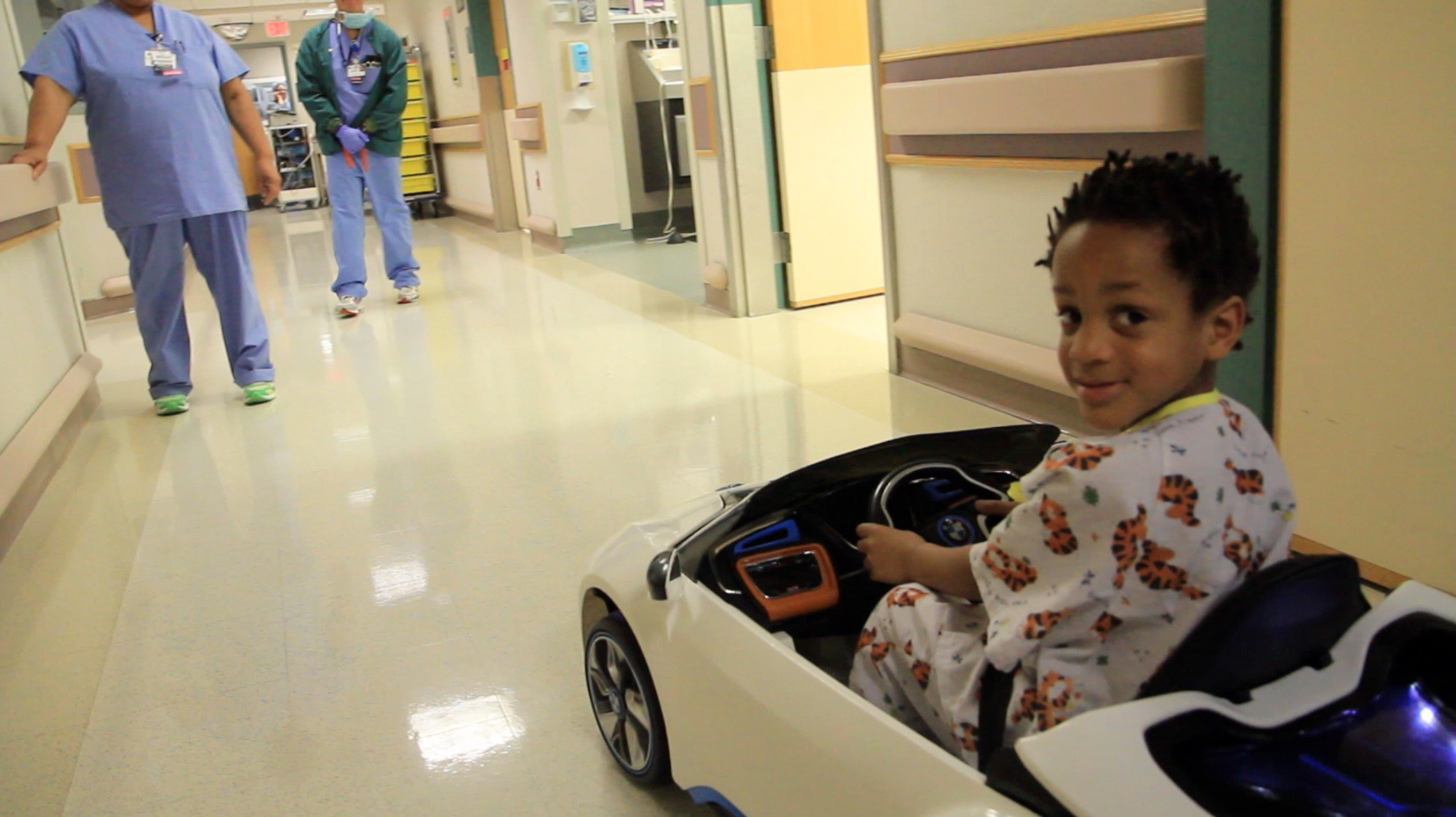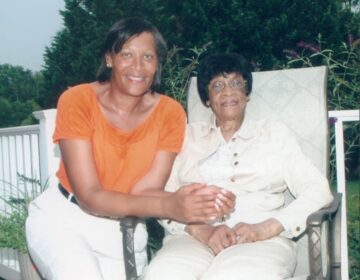‘Driving’ to Delaware operating room gets kids revved up for dental surgery
Listen
Four-year-old D’Juan Roane-Kirby "drives" into the operating room at a clinic that's part of the Christiana Care Health System in Wilmington, Delaware. (Kimberly Paynter/WHYY)
Miniature vehicles are helping a Wilmington, Delaware, clinic ease fear before surgery and cut down on medication.
Four-year-old D’Juan Roane-Kirby was quietly coloring with a purple crayon in an outpatient surgery clinic in Wilmington, Delaware.
DJ, as Taneha Kirby-Roane calls her son, was waiting to have some dental work done — fillings and crowns for some bad cavities.
“He’s coloring his giraffe,” said Kirby-Roane. “Staying focused, trying to keep him calm a little bit.”
DJ was going to have general anesthesia during the procedure. The clinic, part of Christiana Care Health System, offers that service for young children and patients with special needs who aren’t able to endure the stress of dental surgery. Even toddlers sometimes need major dental work.
But getting ready to go into the operating room can be especially terrifying for kids this age.
“There’s a lot of anxiety going into surgery, even as an adult, so you can imagine there’s anxiety as a child as well,” said Debbie Gigliotti, the nurse manager at the clinic.
The most anxious children need to be given the sedative drug midazolam to calm them down before they’re separated from mom or dad to go to the operating room, said Gigliotti.
And that moment of separation is hard on parents too.
“You know, there goes your little one off to the operating room where you have no control over what happens to them,” Gigliotti said.
Parents bringing their kids in for surgery often have concerns about the anesthesia or sedative medications they will get. While midazolam has a long record of safe use in children, some doctors are looking for ways to treat preoperative anxiety without the drug.
The Christiana Care clinic is stocked with a variety of activities for calming kids’ nerves; there’s coloring supplies, stickers, and movies.
Not long ago, the clinic staff upped the ante, introducing a special toy that they say cuts down on medication and puts everyone on a more joyful road to surgery: a pint-sized BMW convertible.
Kids get to drive the electric Power Wheels-sized car from their waiting room to the operating room, giving families something to look forward to in the scary transition.
‘You need to do something for the child’
Children between the ages 8 months and 5 years tend to experience the highest levels of anxiety before surgery, said Zeev Kain, an anesthesiologist and professor at the Yale School of Medicine who has been doing research on preoperative anxiety since the mid-’90s.
This distress before medical procedures presents a problem “not only because it causes hardship to the kids and parents,” Kain said, but “because the higher your anxiety before surgery, the more delayed your recovery after surgery is.”
That means delayed healing, more pain, and more nightmares later on, he said.
Kain said treatment with midazolam can safely prevent the bad outcomes of preoperative anxiety with minimal side effects, but some doctors believe that avoiding the use of the drug is preferable.
Regardless of whether doctors use midazolam or toy cars, Kain said, it’s important to nip preop anxiety in the bud.
“You need to do something for the child,” he said.
DJ’s drive
After staff at the Christiana Care clinic started using the car a couple years ago, they noticed that they didn’t need to use midazolam to sedate children before dental surgery as often as before. They began collecting data on this.
The clinic’s medical director, Stephen Tanner, said that the rate of medication with the drug decreased by about 70 percent.
“Not only is it a great experience for the kids and a great distraction, it also keeps us from having to give them medicine that patients may not necessarily need,” Tanner said.
Tanner, who was DJ’s anesthesiologist, is known as the clinic’s “garage keeper.” He talks up the cars as he prepares patients and families for the trip to the operating room.
As DJ’s big moment draws nearer, he’d put down the crayons and was starting to get antsy, twisting and turning in parent Kirby-Roane’s lap.
Tanner came in to tell his patient about the car he’ll get to drive, and a little while later used a remote control to wheel over DJ’s ride. He kept control with the remote to avoid any fender benders on the way to the OR.
A nurse checked DJ’s “license and registration” — that would be his hospital bracelet — and DJ hopped into the car.
“Just push that button, and you going’,” Tanner told him.
The car whirred and whined as DJ got going, sputtering at first as he got the hang of the controls.
But then he was cruising — right past a set of double doors where Kirby-Roane must wait. DJ didn’t even seem to notice.
Kirby-Roane let out some laughter as the whirring of the mini convertible faded and her son disappeared around a corner.
“That was too cute,” she said. “That was awesome.”
WHYY is your source for fact-based, in-depth journalism and information. As a nonprofit organization, we rely on financial support from readers like you. Please give today.





